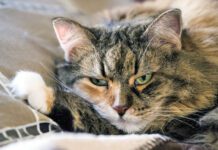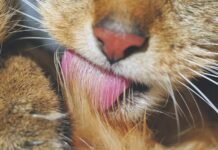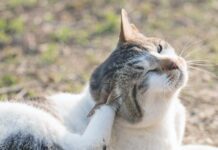What comes to mind when you hear the word fiber? Whole wheat bread? Salad? A hemp rope? Fiber, because it is derived from plant material, is all of these and more. Dietary fiber – also known as roughage or bulk – is a type of carbohydrate that plays a vital role in the function of the gastrointestinal tract.
Unlike other nutrients, fiber is not digested by gastrointestinal enzymes. Instead, some fiber is broken down or fermented by bacteria in the intestines (fermentable fiber). Dietary fiber also helps the contractions that move food through the intestines (non-fermentable fiber).
Friend or Foe
Ana Hill, DVM, PhD, is a clinical nutrition resident under the direction of Tony Buffington, DVM, PhD, board certified in veterinary nutrition and professor of veterinary clinical services at The Ohio State University Veterinary Hospital. Cats may get something like insoluble fiber in the form of the hair they swallow as they groom themselves, says Dr. Hill. Cats in the wild would also ingest both fermentable and non-fermentable fiber by eating the contents of the intestinal tracts of their prey. Fiber in food can replace some of the fiber from prey for domesticated cats.
Some fibers are highly fermentable – rapidly broken down and digested within the GI tract. The fermentation process creates short-chain fatty acids, which is an important energy source for the cells that line the intestinal tract. This group includes pectin and gums such as carob bean gum and locust bean gum. Overfeeding these soluble fibers can result in gas and unformed – even liquid – stools.
Other fibers, such as cellulose, are considered poorly fermentable or non-fermentable and pass through the digestive tract relatively untouched. This type of fiber forms the bulk necessary to stimulate digestive motility or movement in the intestines. Commonly thought to help with constipation, overfeeding such fiber can actually cause constipation.
In between is moderately fermentable fiber. Beet pulp is a common moderately fermentable fiber used in cat foods, and is derived from the material left over after the sugar is extracted from sugar beets. Beet pulp fiber contains a balance of bulk and short-chain fatty acids, and contributes to the production of moist, well-formed stools and healthy intestinal lining.
According to Dr. Hill, several conditions appear to benefit from supplemental fiber:
Weight control. Fiber acts to dilute the calories and helps cats feel full on less food. Portion control is still necessary though, since cats will eventually adapt by eating more food.
Diarrhea or constipation. Fiber sometimes appears to help smooth out transit time, comments Dr. Hill, possibly by holding water in the stool and providing a gelling effect so that stools return to a more normal consistency.
Colitis or colon inflammation. Soluble fiber is fermented by gut bacteria to provide short-chain fatty acids that may help nourish the cells lining the colon as they heal, says Dr. Hill.
Diabetes. Some fiber appears to also help smooth out carbohydrate absorption and reduce spikes in blood glucose, says Dr. Hill. However, this currently is a controversial topic in veterinary clinical nutrition.
The Importance of Regularity
Regular bowel movements are essential to good health; fiber, therefore, is an essential part of a well-balanced diet. But the key to feeding fiber is balance. You cant simply toss a bran muffin into a cats breakfast bowl, like we might for ourselves. As carnivores, cats need far less plant material in their diet than humans.
They also have a much shorter digestive tract so high levels of poorly fermentable fiber – which speed the movement of food through the intestinal tract – can result in diarrhea and decreased absorption of other nutrients. The calories are diluted, but so is everything else.
For most of us, the safest – and easiest – way to increase fiber content in our cats diet without compromising nutrition is to feed a properly formulated diet.
We recommend a commercial diet that is appropriate for the pets condition, says Dr. Hill. This way, the pet cant pick out specific ingredients from the diet, and the owner cant accidentally leave out ingredients.



